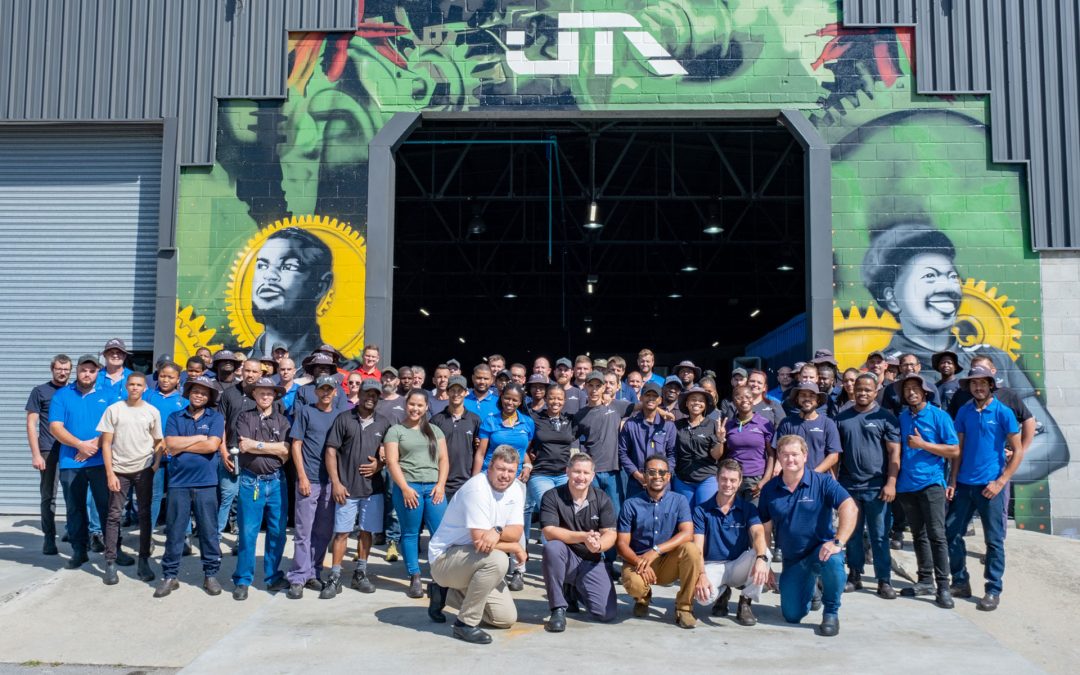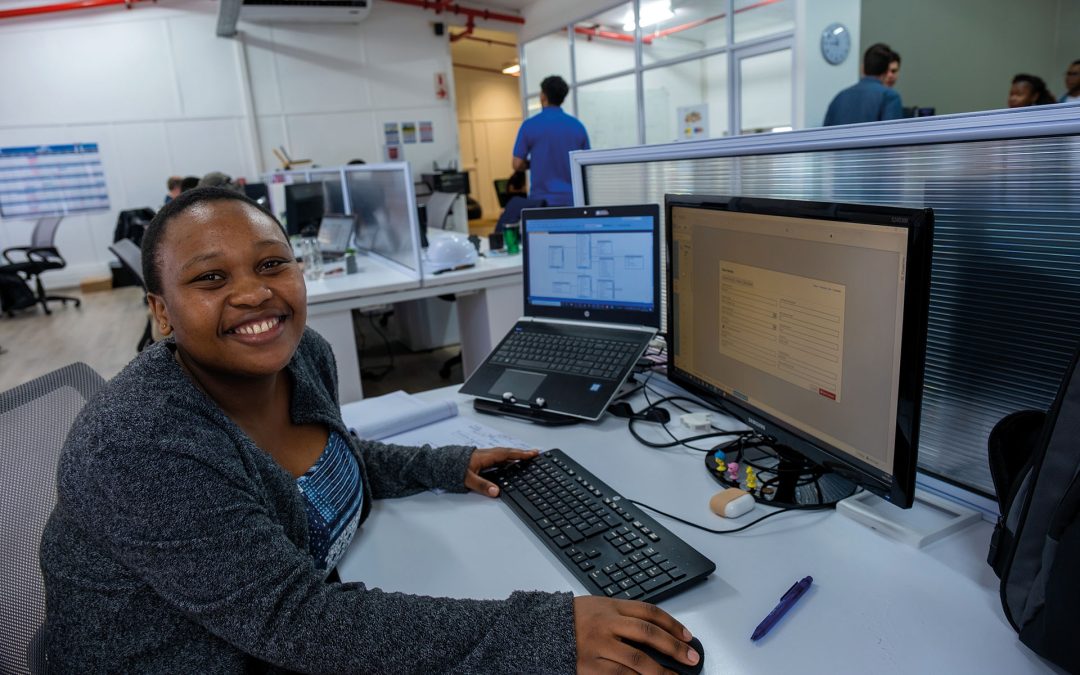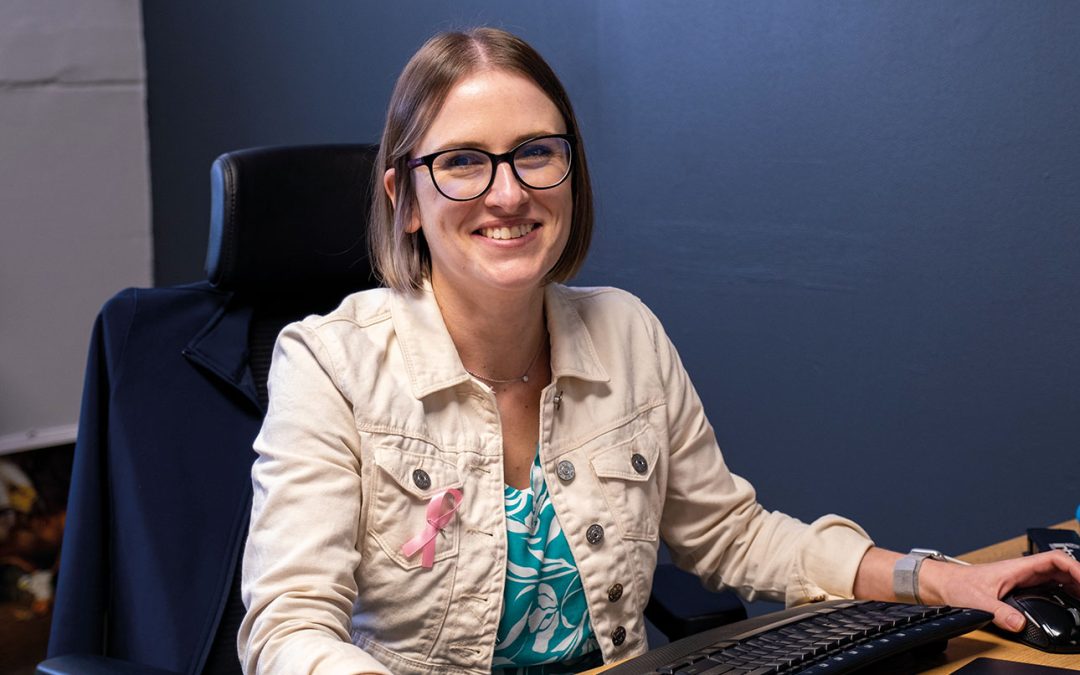
by NewsAdmin | Jan 30, 2023 | Jendamark News
MAD MURAL: Jendamark’s manufacturing, assembly and design department celebrates the unveiling of their new mural, which honours the role of the artisan in industry, at the company headquarters in Gqeberha.
A LEADING South African tech company is spotlighting the country’s critical shortage of qualified artisans, with the hope of encouraging school leavers to pursue the much-needed technical trades.
According to Jendamark Automation, which builds and exports automotive component assembly systems for the global market, artisans are in high demand both locally and abroad, with good career prospects for those who progress successfully through vocational training programmes.
Last November, minister of higher education, science and innovation Blade Nzimande stated that South Africa needed at least 60% of school leavers to pursue artisan type training to meet the country’s demand for scarce skills.
Jendamark manufacturing and assembly manager Marinus van Rooyen said the company had noticed a worrying decline in the number of applications for advertised positions for artisans, especially among toolmakers.
“We are concerned about this trend and have found that this challenge is not unique to Jendamark, as our local and national manufacturing suppliers are experiencing the same frustration,” said Van Rooyen.
He said most matriculants viewed a university degree as the only qualification to aspire to but that many flourished in a more hands-on, practical learning environment.
“South Africa’s manufacturing sector can only grow if we have the talented engineers, artisans and technicians who have the skills to build and fix things,” said Van Rooyen.
Speaking at the official unveiling of a mural by Gqeberha-based artist Buntu Fihla at the company’s manufacturing and assembly hall, Van Rooyen said the aim of the mural was to instil pride among employees and to depict respect for the artisan.
“We want visiting school groups, students and employees to understand the value of having a trade and that it is a career path to be proud of, which offers many opportunities.
“For trade-tested artisans, the world is their oyster. There is a shortage of technical skills globally and we have found that many South Africans are being lured overseas by international recruiters.”
The country’s National Development Plan has a set target of turning out 30,000 artisans per annum by 2030. Current estimates suggest an average closer to 20,000, resulting in a shortage of what are categorised as “priority skills”.
Van Rooyen said Jendamark had been contributing to this skills development drive for the past decade by running its own in-house apprenticeship programme for mechanical fitters, electricians and toolmakers.
The four-year programme, which is overseen by MERSETA and endorsed by the Department of Higher Education and Training, has so far delivered an overall 98% pass rate for apprentices taking their trade test.
Qualified toolmaker and apprentice mentor Funeka Gusha, herself a product of the programme, is responsible for coaching Jendamark’s toolmaker apprentices through the work-based learning process.
“In becoming an artisan, you gain lots of skills and opportunities,” said Gusha.
“You’ll be able to earn an accredited Red Seal certificate, do better paid work, and, like me, may even be called upon to teach others.”
As a woman in a male-dominated industry, she said she was proud to have chosen a challenging career path and was pleased to share her expertise and experience with the young men and women coming through the ranks.
“I’m enjoying being a mentor. It has taught me a lot in terms of personal growth, patience and dealing with the different students. Seeing them working hard with determination inspires me. We’ve got one candidate who is preparing for his trade test right now and the dedication he is showing is amazing.”

by NewsAdmin | Jan 23, 2023 | Jendamark News
It has been a trial by fire for one of ODIN Manufacturing’s newest developers, Asanda Madikizela, who, fresh from university, has risen rapidly to the challenge of making ODIN Manager a reality.
Part of the ODIN Workstation offering, ODIN Manager is a web-based application that allows customers to configure their production processes and access data straight from the production line.
“My job involves both back-end and front-end development, which is challenging and exciting at the same time,” says Madikizela, who has been working on the app for the past year.
“There’s a satisfaction one gets when that piece of code not only works but has a great interface to go with it.”
Her focus is on adding new features, making continuous improvements to existing ones, and fixing bugs to maintain efficiency and usability.
“I’m currently being challenged to create a scheduler page, which is quite complex. The gist of it is that the page must allow the user to create a scheduled job for a particular substation and assign schedules to it, which can be executed in three different ways – time based, part count or shift based. These scheduled jobs contain a list of jobs that must be executed for the operations to be marked as complete.”
She says one of the most fun and challenging aspects is ensuring that the interface is smooth and efficient to allow the user to add all the necessary information without running into complications or being unable to use the system effectively.
“I’m still brainstorming how the UI will look for this one and it’s promising to be the most exciting yet.”
Of course, moving from the front end to the back end has not been without its challenges.
“I would say I’m most proud of the work I did with the operations page rewrite, which is the most recent feature I worked on. It made me sweat and cry, and yet it brought me so much satisfaction and growth.
“The operations page had a lot of interacting tables. I remember being stuck for over a week trying to figure out how to get the image coming from a separate tab to be displayed on a second tab without having to hit the refresh button. This was previously on a separate page, and all you had to do was click a button and it would redirect you.
“I remember getting to a point in the second week where I actually went to the bathroom and cried a bit. I thought to myself, ‘I’m going to be stuck on this for another week, aren’t I?’”
Madikizela says she grappled with the problem, which was with the initialisation of the page, for days on end until a simple answer presented itself.
“Imagine my shock when, after a long and tiring trial and error, the problem was solved by only calling a certain property on the tab that allows the pages to be initialised for the first time when the user clicks on the tab.
“But honestly, I learnt a lot during that process; the most important was patience, and to continue searching for the answer even when you feel like you’ve done everything that you can. Because there’s always one more thing you can try.”

by NewsAdmin | Jan 10, 2023 | Jendamark News
Jendamark Automation’s head of finance, Jacqui Nagle, is used to crunching big numbers and making tough business decisions. We asked her for an honest account of what it’s like to be a woman in the hot seat.
“I started at Jendamark on secondment in my final year of articles, and never looked back. The passion that runs through the veins of this company is what drew me to it and keeps challenging me every day.
In my experience, talking about women in the workplace can be a very taboo subject. We are in that awkward friend zone, where we are making progress, but not quite there yet globally.
I can honestly say that being a woman at Jendamark has never been particularly challenging for me. Yes, there have been the odd nuances and usual stereotypes from colleagues or service providers, but never have I felt the need to prove myself because of my gender. This has a lot to do with the directors and the culture they have created.
Don’t get me wrong; there are challenges. As I write this, while rocking my daughter to sleep after a long day*, I know that a lot of it has to do with previous generations not changing quickly enough and the knock-on effect this has had on the generation of women currently in leadership positions.
Women are often still expected to be the default parent and homemaker, and many companies are not in tune with a woman’s needs. A big fear among women is how we become mothers without compromising our careers.
I had an older man ask if I had been bothered by work during my maternity leave. When I said ‘No, not at all!’, he was surprised and exclaimed how lucky I was. This should not be considered luck. This is how it should be in every company in every country globally. Burnout is a serious risk among this generation of career-oriented women who are also becoming moms.
However, the new generation emerging from university is putting its collective foot down when it comes to gender roles. Seeing this, I know that in the near future the discussion around women in the workplace will no longer be necessary because it will no longer be of any relevance.
One of our management team’s directives for 2022 was to hire more women. This is not because we feel women need an advantage but rather because of the value we add, which is becoming increasingly clear globally.
Women are key role players when it comes to facilitating engagement, passion and empathy within the organisation and among colleagues. Nowadays, people want more out of their jobs. It’s not just about money or status but about the intrinsic value it adds to a person’s life.
Within Jendamark, our wellness days, talent pools and employee engagement initiatives are driven largely by our female colleagues. This is testament to our passion for the well-being of all people in the workplace.
It used to frustrate me that women were stereotyped as the more emotional sex, which translates to us often being labelled aggressive instead of assertive, or argumentative instead of honest. I’ve come to realise that it simply means our passion shines through, and for that we should be proud.
I often see social media posts by women saying, ‘Let’s be more like our male colleagues – don’t apologise when you’re late, no need to say thank you…’ But this, I believe, is more reflective of historical egos than gender.
I don’t agree with changing ourselves, as men or as women, for fear of judgement. Be professional, absolutely, but let us never lose our passion or enthusiasm for what we do!”
*Disclaimer: My husband is in the next room putting my son to bed, and he cooked supper, so I’m not that hard done by!


